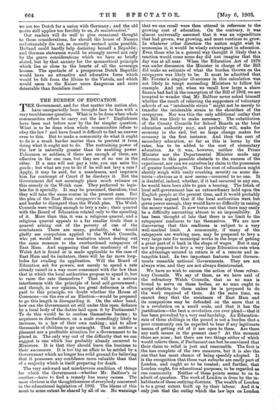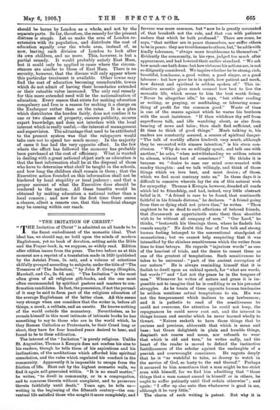T HE Government, and for that matter the nation also, have
unexpectedly been brought face to face with a very troublesome question. What is to be done when whole communities refuse to carry out the law ? Englishmen have been met before now by the far simpler question, What is to be done when whole communities refuse to obey the law ? and have found it difficult to find an answer even to this. But to make a community do what it ought to do is a much harder matter than to prevent it from doing what it ought not to do. The restraining power of the law is naturally greater than its enabling power. Policemen or soldiers, if there are enough of them, are effective in the one case, but they are of no use in the other. If a man will not pay a rate, you can seize his goods ; but what are you to do if he will not levy a rate ? Apply, it may be said, for a mandamus, and imprison him for contempt of Court if he disobeys it. But the Government did not seemingly place much reliance on this remedy in the Welsh case. They preferred to legis- late for it specially. It may be presumed, therefore, that they will take the same course in the present case. But the plea of the East Ham ratepayers'is more elementary and harder to disregard than the Welsh plea. The Welsh Councils were willing enough to levy a rate ; their quarrel with the Board of Education related only to the spending of it. More than this, it was a religious quarrel, and a religious quarrel appeals to a far smaller circle than a quarrel arising out of the poverty of one of the combatants. There are many, probably, who would gladly see compulsion applied to the Welsh Councils, who yet would feel some hesitation about dealing out the same measure to the overburdened ratepayers of East Ham. And supposing that the machinery of the Welsh Act is found or is made applicable to the case of East Ham and its imitators, there will be far more loop- holes for evading its application. Will the Board of Education ask for powers, not merely to spend a rate already raised in a way more consonant with the law than that in which the local authorities propose to spend it, but to raise the rate themselves ? That will be a serious interference with the principle of local self-government ; and though, in our opinion, too great deference is often paid to this principle, we doubt whether the House of Commons—on the eve of an Election—would be prepared to go this length in disregarding it. On the other hand, how can the Government sit still under this open defiance by a local body of the duties laid upon it by Parliament ? To do this would be to confess themselves beaten ; to acquiesce in disobedience, on a scale exceedingly likely to increase, to a law of their own making ; and to allow thousands of children to go untaught. That is neither a pleasant nor a profitable situation for a Government to be placed in. The only way out of the difficulty that we can suggest is one which has probably already occurred to Ministers. It is that they should leave the business to their successors. It is too big an affair to be settled by a Government which no longer has solid ground for believing that it possesses any confidence more valuable than that of a majority which is itself preparing for death.
The very awkward and mischievous condition of things for which the Government—whether Mr. Balfour's or another—have to find a remedy has many causes. The most obvious is the thoughtlessness of everybody concerned in the educational legislation of 1902. The blame of this must to some extent be shared by all of us. No warnings that we can recall were then uttered in reference to the growing cost of education. On the contrary, it was almost universally assumed that it was an expenditure that had grown, was growing, and must continue to grow. In whatever other direction the nation " might wish to economise it, it would be wisely extravagant in education. Even those who in a general way thought it likely that a reaction would come some day did not imagine that this day was at all near. When the Education Act of 1870 was under discussion the Minister in charge of the Bill did make an estimate of what the burden thrown on the ratepayers was likely to be. It must be admitted that. Mr. Forster's singular ill-success in this calculation was not likely to tempt succeeding Ministers to follow hid example. And yet, when we -recall how large a share finance had had in the conception of the Bill of 1902, we are tempted to wonder that Mr. Balfour never asked himself whether the result of relieving the supporters of voluntary schools of an " intolerable strain " might not be merely to transfer the intolerable strain to the shoulders of the ratepayers. Nor was this the only additional outlay that the Bill was likely to make necessary. The substitution of the County Councils for School Boards as the local education authority may, and probably will, make for economy in the end, but no large change makes for economy in the first instance. And then the cost of secondary education, so far as this is borne by the rates, has to be added to the cost of elementary education. As it was, however, neither the Prime Minister nor the Departmental Minister made any reference to this possible obstacle to the success of the experiment, nor can we ourselves lay claim to the possession of greater forethought. That the cost of education might shortly weigh with really crushing severity on some dis- tricts—obvious as it now seems—occurred to no one. It is doubtful, indeed, whether, if it had occurred to any one, he would have been able to gain a hearing. The fetish of local self-government has an extraordinary hold upon the English people at the present time, and it would probably have been argued that if the local authorities were but given power enough, they would have no difficulty in raising the money wanted. It now turns out that there may easily be a difficulty amounting almost to an impossibility. It has been thought of late that there is no limit to the ratepayers' readiness to tax themselves. We are now discovering that this readiness is subject to a very well-marked limit. A community, if many of the ratepayers are working men, may be prepared to levy a very large rate for municipal works in the hope of getting a great part of it back in the shape of wages. But it may not be prepared to levy a very large Education-rate when the advantage secured in return is of a remote and in- tangible kind. In two important features local Govern- ments resemble national Governments. They are not always wise, and they are not always disinterested.
We have no wish to excuse the action of these refrac- tory Councils. We say of them, as we have said of the refractory Welsh Councils, that as no man is bound to serve on these bodies, so no man ought to accept election to them unless he is prepared to do the work required of them. At the same time, we cannot deny that the resistance of East Ham and its companions may be defended on the score that it is a revolution on a small scale, and that it has the justification—the best a revolution can ever plead—that it has been provoked by a very real hardship. An Education- rate of three shillings in the pound is not a burden that a poor community can be expected to bear if any legitimate means of getting rid of it are open to them. Are there any such means in the present case ? At this moment' there are none ; but there are two things either of which would relieve them, if Parliament can but be convinced that their claim to relief is just and reasonable. The first is the less complete of the two measures, but it is also the one that has most chance of being speedily adopted. It is the recognition that these vast suburbs are really part of .London, and ought so to be treated; and further, that London ought, for educational purposes, to be regarded as one community. Neither of these points seems to us to admit of question. The work of London is done by the in- habitants of these outlying districts. The wealth of London is to a great extent built up by their labour. And it is only just that the outlay which the law lays on London should be borne by London as a whole, and not by the separate parts. So far, therefore, the remedy for the present distress is simple. Let us make the area of London co- extensive with its population, and distribute the cost of education equally over the whole area, instead of, as now, leaving each division of London to look after its own children, and no more. This, however, is but a partial remedy. It would probably satisfy East Ham, but it could only be applied in cases where the circum- stances ate similar to those of East Ham. There is no security, however, that the disease will only appear where this particular treatment is available. Other towns may find the cost of education becoming unendurable, towns which do not admit of having their boundaries extended or their rateable value increased. The only real remedy for this more extended need will be the nationalisation of education. Every reason that exists for making education compulsory and free is a reason for making it a charge on the Exchequer rather than on the rates. It is a plan which distributes the burden fairly, does not confine it to one, or two classes of property, ensures publicity, secures expert knowledge, and does not interfere with the local interest which is really useful,—the interest of management and supervision. The advantage that used to be attributed to the present system was that the ratepayers would take care not to spend too much money. In the majority of cases it has had the very opposite effect. In the few where the effect has followed the economy has probably been purchased at the cost of efficiency. What is wanted in dealing witiva great national object such as education is that the best information shall be at the disposal of those who have to-determine what shall be taught in the schools, and how long the children shall remain in them ; that the Executive action founded on this information shall not be hindered by local stupidity or local jealousy ; and that a proper account of what the Executive does should be rendered to the nation. All these benefits would be obtained by making education a national rather than a local concern ; and now for the first time there seems a chance, albeit a remote one, that this beneficial change may be coming within our reach.











































 Previous page
Previous page